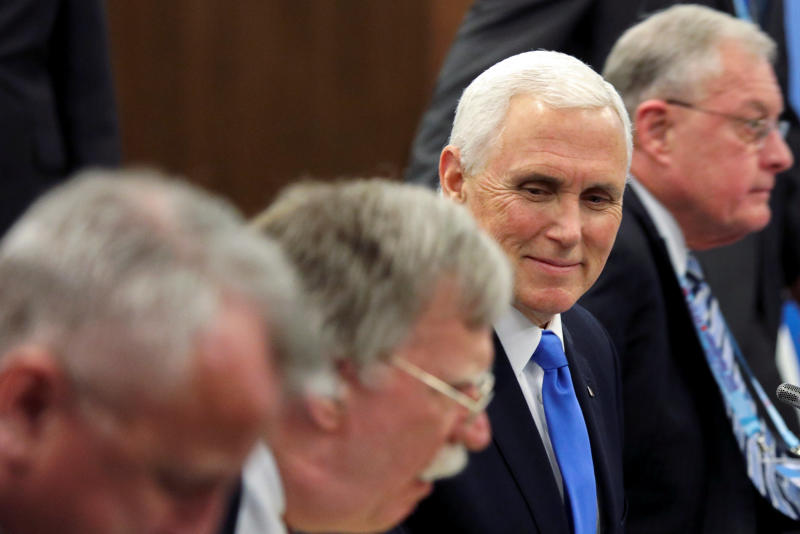33rd Asean Summit
US officials defend Trump's no-show at summit
Diplomat Tommy Koh questions US administration's commitment to Asia-Pacific
Sign up now: Get ST's newsletters delivered to your inbox

US Vice President Mike Pence (2nd from right) holds a bilateral meeting with Indonesia's President Joko Widodo (not in picture) on the sidelines of the 33rd Association of Southeast Asian Nations (ASEAN) summit in Singapore on Nov 14, 2018.
AFP
Veteran diplomat Tommy Koh yesterday questioned the Trump administration's commitment to the Asia-Pacific region, calling attention to President Donald Trump's decision to absent himself from key Asean meetings and asking if the US concept of a free and open Indo-Pacific had an ideological bent that excluded China.
He was also critical of Mr Trump's disruption of the rules-based, multilateral international order which has underwritten Asia's prosperity.
Professor Koh, Singapore's Ambassador-at-Large, was speaking in his personal capacity at a conference where he was joined by Acting US Assistant Secretary of State Patrick Murphy; Charge D'affaires Piper Campbell, who is the top US diplomat to Asean; and Mr Michael Michalak, senior vice-president and regional managing director of the US-Asean Business Council.
The event was organised by the S. Rajaratnam School of International Studies and the Washington-based East-West Center.
"If Asia matters to America, why is your leader, President Trump, not here?" Prof Koh asked.
Mr Trump is represented by Vice-President Michael Pence, who will participate in today's Asean-US meeting and the East Asia Summit.
Mr Trump was in Singapore in June for a historic meeting with North Korean leader Kim Jong Un.
The US officials at the conference defended Mr Trump's decision to send Mr Pence in his place, calling him a close associate who would effectively deliver Mr Trump's message that Asean is central to US policies in the region.
"Do not diminish the importance of Mr Pence being here," said Ms Campbell, noting that he made a number of trips to Asia, including one to Jakarta last year, where he spent time at the Asean Secretariat.
He also met visiting Asean leaders during the United Nations annual meetings in New York in September.
Prof Koh also questioned the US vision of a "free and open" Indo-Pacific, first announced by Mr Trump at the Apec summit in Vietnam last year and aimed at defending American interests against China's ever-growing presence.
"I am not comfortable with the US abandoning a concept that we know and have used for many years - the Asia-Pacific," he said, adding that Washington's shift had left many Asian nations puzzled.
"Is the Indo-Pacific purely a geographic concept, or is it also ideological?"
More recently, the US has given the Indo-Pacific an ideological spin with its prefix "free and open", Prof Koh said.
"This appears to be driven by the so-called quad countries - the US, Japan, Australia, which are allies, and India. These are democracies. Many of us feel a slight discomfort because if it is ideological in content, is it intended to exclude countries which are not democracies?
"Is the strategic intent targeted at excluding China?
"If that is the intent, then we are not comfortable because we in Asean want a regional order that is open and inclusive."
He also said that Asian nations were concerned by Mr Trump's overturning of the US-led liberal order, which had ushered in prosperity through a free exchange of goods, services and technology.
The US trade war with China has sparked tit-for-tat tariffs that threaten world growth.
Ms Campbell responded to the perception that the US freedom of navigation operations in the region are "provocative".
China has raised objections to these operations, which are intended to counter what Washington sees as Beijing's bid to hold sway in the strategic waters, where Chinese, Japanese and some Southeast Asian navies operate.
"To describe these as provocative is to buy into the false equivalency which is a narrative that we are finding really challenging," Ms Campbell said.
"When China militarises disputed islands, that is an aggressive action. For a country in this region to be militarising features at the same time that it is engaging in a negotiation of a code of conduct, those are problematic actions, not the action of the US."
China and Asean are in talks for a code of conduct to manage differences in South China Sea territo-rial disputes.
In his comments earlier in the session, Mr Murphy said US regional policies place Asean squarely at the centre, saying: "This is not a region where any single country should dominate, bully or coerce or design the rules. The rules are already there."
Tackling criticism against the trade tariffs, Ms Campbell said Washington was seeking to make free trade fair.
"We need to work together to remove non-tariff barriers, to call out behaviour which is inconsistent with agreements," she said in a reference to Washington's complaint that China has not opened up its markets fully and indulges in theft of US intellectual property.
Dr Satu Limaye, director of the East-West Center, said the US vision of the Indo-Pacific was ideological to the extent that it had norms like the US respect for national sovereignty, contrasting it with some of China's policies criticised for creating "debt traps" with unsustainable loans.
"If that is what is meant by ideology, that serves the interests not just of the US, but also the region," Dr Limaye said.


